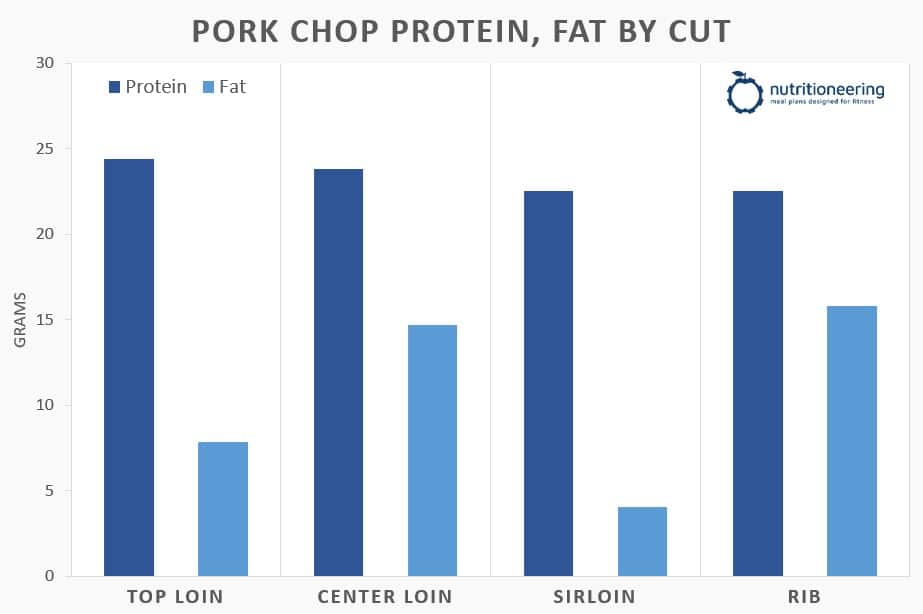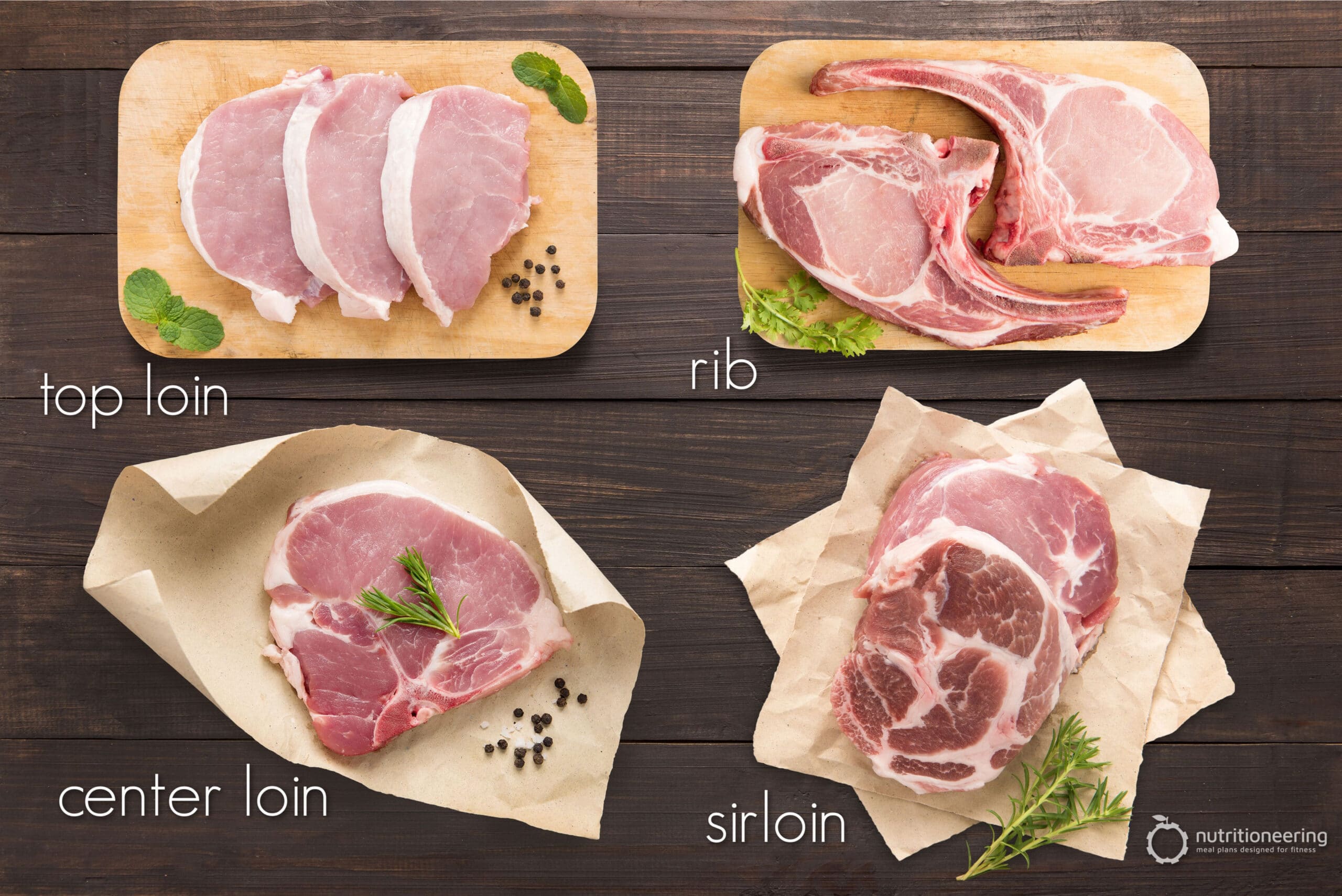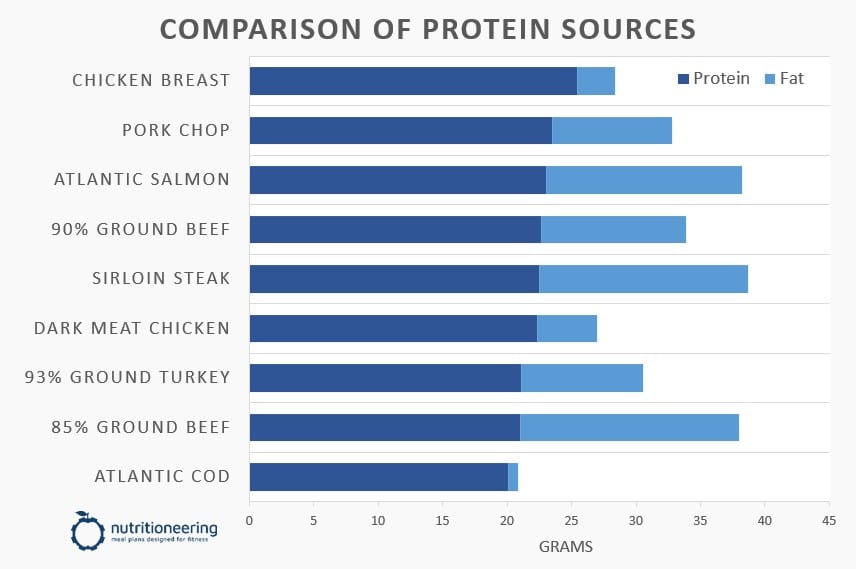Pork Chop Protein Power: Unlocking The Nutritional Secrets Of Your Favorite Cut
There's something about pork chops that just hits different, right? Whether you're grilling, frying, or baking them, these cuts of meat are a staple in kitchens worldwide. But have you ever stopped to think about what makes pork chops such a powerhouse of nutrition? The secret lies in their protein content, and today we're diving deep into the world of protein in pork chops. If you're looking to fuel your body with quality nutrients, this article has got you covered.
Protein is the building block of life, and pork chops are packed with it. It's not just about the taste; it's about the nutritional punch that these cuts deliver. From muscle repair to supporting your immune system, the protein in pork chops plays a vital role in keeping your body strong and healthy.
But wait, there's more! We're not just talking about any old protein here. The protein found in pork chops is complete, meaning it contains all the essential amino acids your body needs. So, whether you're an athlete looking to bulk up or someone trying to maintain a balanced diet, pork chops are here to save the day.
Read also:Vanessa On Family Feud The Ultimate Guide To Her Journey Success And Impact
Why Protein in Pork Chops Matters
Alright, let's get down to business. Protein is not just a buzzword; it's a necessity. When it comes to pork chops, the protein content is what makes them a nutritional powerhouse. On average, a 3-ounce serving of pork chop delivers around 26 grams of protein. That's a pretty impressive number if you ask me.
But why does this matter? Well, protein is essential for muscle growth and repair. If you're hitting the gym regularly, incorporating pork chops into your diet can help you recover faster and build lean muscle mass. Plus, it keeps you feeling full longer, which is a win-win for those trying to manage their weight.
The Nutritional Breakdown of Pork Chops
So, what exactly are you getting when you chow down on a pork chop? Let's break it down:
- Protein: As we've already established, pork chops are loaded with this macronutrient.
- Fat: Don't be scared of the fat! Pork chops contain healthy fats that are crucial for hormone production and energy.
- Vitamins and Minerals: Pork chops are rich in B-vitamins, zinc, and selenium, which support everything from energy metabolism to immune function.
When you look at the bigger picture, pork chops aren't just delicious—they're a nutritional goldmine.
How Much Protein is in a Pork Chop?
Now, let's talk numbers. A typical pork chop contains about 26 grams of protein per 3-ounce serving. That's roughly the size of a deck of cards, so it's pretty easy to eyeball. But here's the kicker: the exact amount of protein can vary depending on the cut and preparation method.
For example, a boneless pork chop might have slightly more protein than a bone-in one, simply because there's more meat to work with. And if you're cooking it in a way that preserves moisture, like sous vide or slow-cooking, you might retain even more of those precious amino acids.
Read also:Fotos De A Love Story Winery Your Dreamy Wine Destination
Factors Affecting Protein Content
Not all pork chops are created equal. Here are some factors that can influence the protein content:
- Cut of Meat: Different cuts have varying protein levels.
- Cooking Method: How you prepare your pork chop can impact its nutritional profile.
- Source of Pork: Grass-fed or pasture-raised pork might offer slight variations in nutrient content.
So, whether you're opting for a rib chop, loin chop, or blade chop, rest assured that you're getting a solid dose of protein.
Health Benefits of Protein in Pork Chops
Now that we've established the protein content, let's talk about why this matters for your health. Protein isn't just about building muscles; it plays a role in virtually every function of your body.
First off, protein supports muscle growth and repair. If you're hitting the gym or engaging in any physical activity, consuming enough protein is crucial for recovery. But it doesn't stop there. Protein also helps regulate hormones, supports immune function, and even aids in weight management by keeping you feeling full and satisfied.
Supporting Muscle Growth
For athletes and fitness enthusiasts, pork chops are a dream come true. The complete protein found in pork chops provides all the essential amino acids needed for muscle synthesis. Leucine, one of the key amino acids for muscle growth, is abundant in pork, making it a top choice for those looking to bulk up.
How to Incorporate Pork Chops into Your Diet
Okay, so you're convinced that pork chops are a nutritional powerhouse. But how do you incorporate them into your daily meals? The good news is, pork chops are incredibly versatile. You can grill them, bake them, fry them, or even slow-cook them for maximum flavor.
Here are a few ideas to get you started:
- Grilled Pork Chops with Herb Butter: A simple yet delicious way to enjoy your pork chops.
- Pork Chop Stir-Fry: Pair your chops with veggies and rice for a quick and nutritious meal.
- Baked Pork Chops with Root Vegetables: A one-pan wonder that's perfect for busy weeknights.
No matter how you choose to prepare them, pork chops are sure to be a hit.
Common Misconceptions About Protein in Pork Chops
Let's address some of the myths surrounding pork chops and their protein content. One common misconception is that pork is high in unhealthy fats. While it's true that pork chops contain fat, not all fats are created equal. The fat in pork chops is a mix of saturated and unsaturated fats, with some cuts containing more healthy fats than others.
Another myth is that pork chops are hard to digest. In reality, the protein in pork chops is highly digestible, making it easier for your body to absorb those essential amino acids. So, don't let these misconceptions stop you from enjoying one of nature's finest sources of protein.
Debunking the "Unhealthy" Label
Pork has long been labeled as an unhealthy meat choice, but that's simply not true. Modern farming practices have led to leaner cuts of pork, making it a viable option for health-conscious individuals. In fact, pork is often referred to as "the other white meat" because of its lower fat content compared to beef.
Comparing Protein in Pork Chops to Other Meats
So, how does the protein content in pork chops stack up against other meats? Let's take a look:
- Chicken Breast: A 3-ounce serving contains about 26 grams of protein.
- Beef Steak: A similar serving size delivers around 23 grams of protein.
- Fish: Depending on the type, fish can range from 20 to 30 grams of protein per serving.
As you can see, pork chops hold their own in the protein department. Plus, they offer a unique flavor profile that sets them apart from other meats.
Choosing the Best Pork Chops for Protein
Not all pork chops are created equal, so how do you choose the best ones for your protein needs? Here are a few tips:
- Look for Lean Cuts: Opt for loin chops or rib chops for higher protein content.
- Check the Label: Choose pork that's labeled as grass-fed or pasture-raised for potential nutritional benefits.
- Consider Preparation: Grilling or baking can help preserve the protein content better than frying.
By making informed choices, you can maximize the protein potential of your pork chops.
Conclusion: Embrace the Power of Pork Chop Protein
So, there you have it—pork chops are not just a tasty treat; they're a nutritional powerhouse packed with protein. Whether you're an athlete looking to build muscle or someone trying to maintain a balanced diet, pork chops have got you covered. With their complete protein profile, vitamins, and minerals, they're a versatile addition to any meal plan.
Now that you're armed with the knowledge of pork chop protein, it's time to take action. Head to your local butcher, pick up some quality chops, and start cooking up a storm. And don't forget to share this article with your friends and family so they can join in on the pork chop protein party!
Table of Contents
- Why Protein in Pork Chops Matters
- The Nutritional Breakdown of Pork Chops
- How Much Protein is in a Pork Chop?
- Health Benefits of Protein in Pork Chops
- How to Incorporate Pork Chops into Your Diet
- Common Misconceptions About Protein in Pork Chops
- Comparing Protein in Pork Chops to Other Meats
- Choosing the Best Pork Chops for Protein
- Conclusion: Embrace the Power of Pork Chop Protein
Article Recommendations


